Illinois lawmaker introduces bill that could hinder Bears' move to suburb as legislative session begins
Published in Football
SPRINGFIELD, Ill. — One of the Illinois legislature’s biggest opponents of the Chicago Bears’ plan to relocate outside the city introduced legislation on Tuesday that could stall or hinder the team’s efforts, but significant questions remain about whether the bill will garner enough support or when it might be voted on.
The legislation from state Rep. Kam Buckner of Chicago — a former University of Illinois football player who represents the district where Soldier Field is located — calls for greater transparency around stadium deals in Illinois and could require the team to dig deeper into its pockets. It remains silent, however, about major financial issues, including whether the franchise would have to pay off outstanding debt for the 2003 Soldier Field renovation, a point some opponents of the team’s move have said is a bare minimum for their support.
In an interview with the Chicago Tribune at the state Capitol after introducing the legislation, Buckner said the bill was a starting point.
“I want to at least lay down the tracks for what the rules of engagement are for us,” Buckner said. “We’ve asked the Bears to come forward with a plan and show their work and show how this is a net benefit to the people. I think they’ve fallen short of that. And so, I think now the ball is back in our court. It’s incumbent upon us to tell what we need to hear from them.”
Buckner’s bill would implement guardrails such as requiring financial agreements for stadium projects to be posted online for a month before any agreement is finalized, as well as requiring public hearings and a public report. It would also require that any subsidies received by teams be repaid with interest if a franchise fails to meet its commitments or relocates.
In addition, the Buckner bill targets the Bears’ plans to negotiate a long-term property tax deal with local schools and other taxing bodies, which is a crucial aspect of the team’s plan to relocate to northwest suburban Arlington Heights. Under Buckner’s proposed legislation, sports franchises would instead have to reimburse schools, libraries and emergency services for property taxes lost as a result of stadium agreements.
Buckner said the Bears’ suggestion that the team would be able to come up with a “special payment” to make up the difference for those taxing bodies does not work “in any semblance of that math.”
The Bears have not said how much officials think the team should pay in property taxes once the stadium project is completed.
The Bears, who have played at Soldier Field since 1971, have announced their intention to construct a 60,000-seat stadium and sports complex on the former Arlington International Racecourse site, which the team purchased in 2023 for $197 million.
But building a new venue, if construction begins this year, would require the state legislature to pass a bill during this month’s six-day veto session to enable them to negotiate the long-term property tax deal with local schools and other taxing bodies. The veto session began on Tuesday and will be held for five more days this month.
Despite the Bears’ issuing economic projections pertaining to their move to Arlington Heights, Buckner said without the public oversight his bill calls for, “there’s no way that any of us should be able to justify giving money to a sports team when that takes money from cops or firefighters or students in a classroom.”
So far, Chicago lawmakers have been reluctant to support any measure that would incentivize the Bears to move outside the city. And despite last month’s economic projections showing a new stadium in Arlington Heights would generate thousands of jobs and billions of dollars in economic activity, it also would cost $855 million in public funds for infrastructure, such as entrance and exit ramps from near Illinois Route 53 and changes to the adjacent Metra train line.
Gov. JB Pritzker said last month the team needs “to pay off what’s owed on the existing stadium,” Soldier Field, as a prerequisite for additional help from the state. He has previously said the state could help with infrastructure surrounding a stadium but has been hesitant to promise public dollars to subsidize the privately owned team.
Buckner said the bill filed on Tuesday would apply to any business seeking to build a sports stadium and looking for state assistance. It’s unclear, given the short schedule and structure of the fall veto session, whether the bill will even be voted on during the session. But it could be a starting point for the legislative session that begins next year.
“If a team wants to build privately and not ask us to do anything, this doesn’t apply to anybody,” he said. “But if you’re asking the people of Illinois to either erase a debt or to incur a debt, in order for them to do that, there’s got to be some rules.”
———
Olivia Olander reported from Chicago.
©2025 Chicago Tribune. Visit at chicagotribune.com. Distributed by Tribune Content Agency, LLC.







Comments